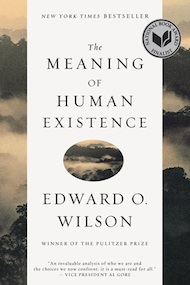By Germaine Cornelissen-Guillaume
In this book, renowned biologist Edward O. Wilson addresses the all-important questions “Does humanity have a special place in the Universe?” “Where are we going?” and “Why? As in his previous works, Wilson makes the case of evolution by natural processes. He starts by elaborating on two definitions of “meaning”: it can imply intention, and hence design, the heart of the philosophical worldview of organized religions and their creation stories. A more inclusive definition of the term considers that the accidents of history are the source of meaning, which is the result of overlapping networks of physical cause and effect. Wilson attempts to define the meaning of the human condition within the scope of this worldview of science.
As the founder of sociobiology, Wilson notes that the biological origin of social behavior shows similarities across species. However, only very late in the history of life, have the most complex societies arisen through “eusociality,” where cooperation across generations and division of labor favor the group over the individual. Possessing a good enough memory to evaluate the prospects and consequences of competing scenarios of future interactions was key to reach this state in humans.
Wilson notes that eusocial behavior has been identified in other species as well, notably in ants, on which he is a leading authority. He proposes that as a result of evolution and multilevel (individual and group) selection, humans are genetic chimeras conflicted between good and bad, individual selection promoting selfishness and group selection encouraging altruism. He makes the case that the formation of groups rather than inclusive fitness was critical to reach eusociality, the similarity of genomes by kinship being an inevitable consequence thereof.
Wilson calls for a unification of the sciences and the humanities to achieve intelligent self-understanding. He views our cultural evolution as priceless because it is entirely a product of the brain. His point is that with advances in technology and genetics, decisions about where to draw the line in tampering with nature rest primarily with the humanities as he casts a vote for existential conservatism to preserve our biological human nature as a sacred trust.
He argues that the very narrow ranges of audio and visual frequencies available to humans for communication make them broadly unaware of the rest of life in the biosphere. As a result, it is being destroyed at an alarming rate as the Earth is increasingly more populated, a situation that needs to be remedied as human life depends on it. He warns that to avoid extinction, sustainability is essential and points out that the human impact on biodiversity is an attack on ourselves. He identifies the main scourges as habitat loss, invasive species, pollution, population growth, and overharvesting.
Wilson recognizes that the human mind has always been an instrument of survival relying on both reason and emotions. Religions are a potent binding force, but tragically, they also are impediments to solving real social problems as spirituality is overshadowed by tribalism at the root of religiosity. Not surprisingly, his last essay on free will offers no final answer: free will may exist by necessity for sanity and the perpetuation of the human species, but that belief may be no more than an illusion.
Drawing many examples from his work as an eminent evolutionary biologist, Edward O. Wilson’s new book delves into important questions of humanity with a clear mind and an engaging style. Being reminded of humanity’s place in the living world on Earth and in the broader cosmos calls for humility and a heightened respect for nature—critical elements for the survival of our species.
Germaine Cornelissen-Guillaume is a professor of integrative biology and physiology and director of the Halberg Chronobiology Center at the University of Minnesota, Twin Cities.




